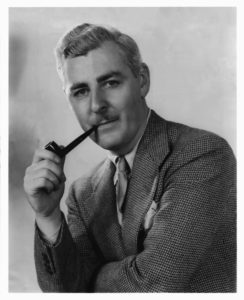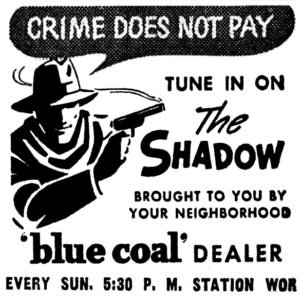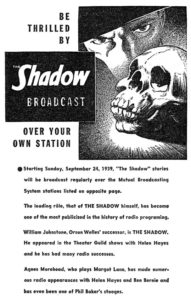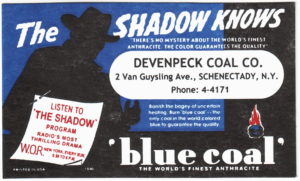
It was the last broadcast of The Shadow in 1940, and it rang out the year with a bang. On Dec. 29, William Johnstone and Marjorie Anderson stepped up to the WOR microphone and began what has become one of my favorite Shadow radio episodes: The Ghost on the Stair.
Yes, it’s a ghost story. And that always gets my attention. But it’s also a rather unusual story for The Shadow, as I’ll explain later. With shuddery excitement I listen to the standard opening of “Who knows what evil lurks in the hearts of men? The Shadow knows!” Hearing to those lines as spoken by Bill Johnstone… his quivery laughter with the organ music of Elsie Thompson in the background… is something of which I’ll never tire. And then, after the requisite, but mercifully short, commercial announcement for Blue Coal, our story starts.
Lamont Cranston and Margo Lane are seated on the verandah of a small hotel in the deep south. They relax in the warmth of the evening, conversing with the hotel owners Roger and Adele Miller. They are recent owners, having inherited it only a month earlier. But they are having trouble attracting guests. No one stays more than one night, and it’s all because of the ghost of Becky Branch.
The hotel used to be part of a great plantation, owned by the Branch family. During the Civil War it was used as a hospital by the Confederate forces. It was during that time that John, a young Union soldier and prisoner, was a patient in the hospital. His nurse was the daughter of the house, beautiful young Becky Branch. The two fell in love… but it was an ill-fated love.
He was fond of music, and every evening Becky would play for him on the spinnet. Their love grew until one night, as she sat playing, he confessed that he would be forced to leave her. His wound had practically healed, and he would soon be taken away to a Confederate prison.
Young love during the Civil War
Desperately, the two lovers made plans for his escape. John would make his way back north and reach the Union lines. He vowed that after the war was over, he would come back to her. Becky told him a way to escape the house, then continued to play the spinnet as he left, hoping to fool the guards into thinking he was still with her.

Over the music, young Becky Branch heard the scream of her lover. She ran out of the music room to find John lying on the stairs landing dead, stabbed through the chest. And no one who could have committed the murder was to be seen. Becky Branch’s part in the attempted escape was discovered and she was banished from the community.
As the years went by, the house passed through many hands. And in each family that lived there, a mysterious death occurred. Each of those deaths was caused by a stabbing. And before each death occurred, the playing of a spinnet was heard. Ghostly music played by ghostly hands… hands that foretold death.
Later, Cranston and Margo speak with the old family retainer, Beauregard. He confirms the legend. He has worked at the old plantation house for many years, and has heard the music with his own ears. And, he’s seen the ghost… the ghost on the stair… the ghost of Miss Becky Branch!
They meet a guest Ralph Simeon, a composer who has traveled to the old hotel to seek inspiration from the departed spirit of Becky Branch. He’s a strange fellow, who plays the old spinnet that still sits in the music room, savoring the beauty of the music of the dead.
There is a scream. Mrs. Turner, another hotel guest, claims she saw the ghostly figure of a woman coming up the stairs to the second floor… a woman who disappeared. Cranston determines to solve the mystery of the killings and the ghost on the stair. Ralph Simeon is convinced it is the ghost of Becky Branch. He foretells that if they are awake at the witching hour of three, they will hear music… lovely music played on the spinnet, by the ghost on the stair.

Now it’s at this point I would normally stop, if I were writing a regular review. The story has been set up, and you would be invited to listen to a recording of the show to hear how it all played out. But this time I’m going to tell you how it ends. The ending is rather unusual, and I can’t discuss it without giving away the ending. So this would be the place where you stop reading, if you have never heard this radio broadcast, and want to listen to it first.
Stop reading here… if you wish
It turns out that there is no murderer. All the deaths were the result of a hidden death trap. Up on the staircase landing, a loose piece of wooden decoration releases a hidden door. A heavy spring thrusts an old bayonet outward, killing the person standing there. It was put there in Civil War times to prevent the escape of prisoners… men like Becky Branch’s soldier.
Ralph Simeon falls victim to that trap and is killed just after the middle commercial. Beauregarde, the old family retainer, discovers him laying on the staircase landing, a stab wound in his chest. Lamont and Margo creep through the darkened old house at the witching hour of three, in hopes of finding the source of the ghostly music. The sound of a spinnet is heard coming from an upper floor. They rush up the stairs to find the owner Roger Miller laying in the same spot on the landing, the same wound in his chest, barely alive.
It’s after Roger Miller has been removed to the hospital that Margo discovers the hidden door and the spring-powered bayonet… and is nearly stabbed herself. But although the mystery of the killings is now revealed, there still remains the unexplained supernatural happenings in the house.

The ghostly music starts up again, and Cranston, as The Shadow, investigates. It comes from somewhere in the passage. There, he finds an old woman playing a spinnet. It is Becky Branch, now a very old woman. Her mind is weak, and when she hears the voice of The Shadow, she mistakes it for the voice of her long lost love, John. She explains she has kept her promise and has waited for him.
She had been forced from the community after his death, and when she returned years later, no one recognized her. She never got over her loss. With her mind weakened, she would sneak into the house every night and play on the spinnet, hoping that some day her playing would bring John back to her. And after many years, she now hears his voice. He has come back to her. Finally, she won’t have to play any more. With a sigh of satisfaction, she collapses dead in The Shadow’s arms.
It’s a bittersweet ending to a wonderfully touching Shadow episode. This radio story was unique among the other Shadow adventures. It was one of the few in which there was no villain. The Shadow fought, not against a bad guy, but against a strange ghostly situation. It was also unique in its sweet yet sad end, where instead of bringing a criminal to justice, The Shadow brought comfort to a dying woman.
The denouement
In the story’s epilogue, everything is explained. Old Becky Branch had entered the house by way of a little-used cellar entrance. The death trap reset itself after stabbing its victim, and so was ready for the next person who tried to use the secret passage, even though it be years later. Roger Miller is recuperating in the hospital, and all is well. All but one thing. The ghostly sightings.
Margo asks, “There’s one point that you haven’t clear up yet, Lamont… that’s the ghost on the stair.” Cranston has no answer.
It’s the old butler Beauregarde who responds, “I can ‘splain that, Mr. Cranston.”
“Can you, Beau?”
“Yes, suh… that was the real ghost!”
That final comment on the radio show was taken directly from the ending of Bob Hope’s comedy/horror motion picture Ghost Breakers, which had been released to theaters only six months earlier: “That was the real ghost!” The line was spoken by Francisco Mederos (Anthony Quinn), and just as in The Shadow broadcast, was the final line of the film. Had the radio scriptwriter, Jerry Devine, been to see this movie? Maybe that line stuck in his subconscious? I’m not saying it was done intentionally. I’m just sayin’…
Luckily recordings of this terrific radio show have survived the years, making this broadcast one that must be heard and enjoyed. If you haven’t ever heard it, do yourself a favor and seek it out. If you have heard it, isn’t it time to listen to it again?
